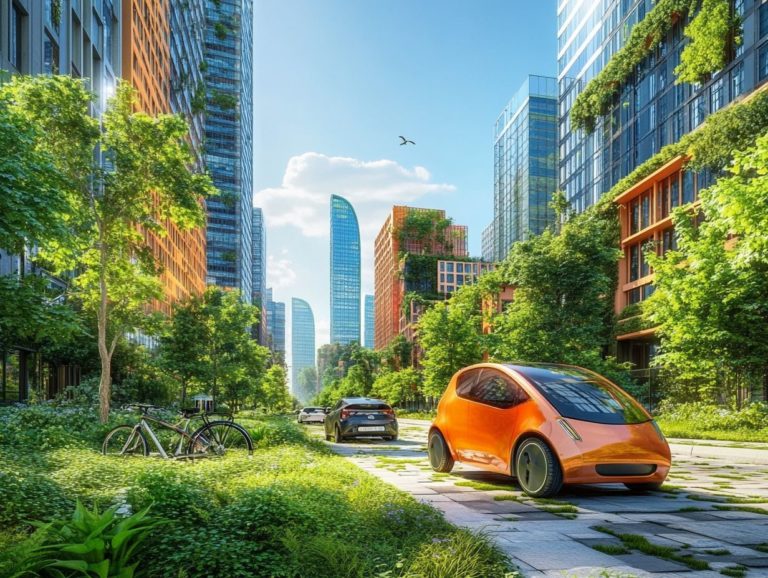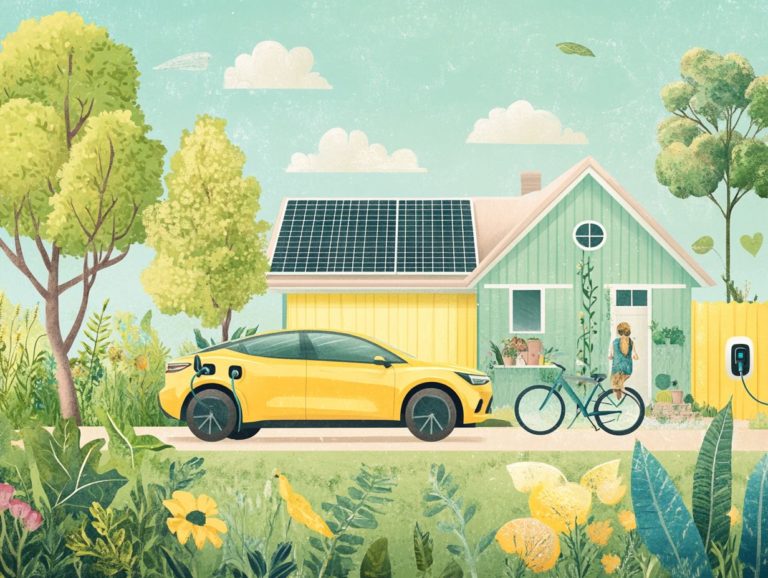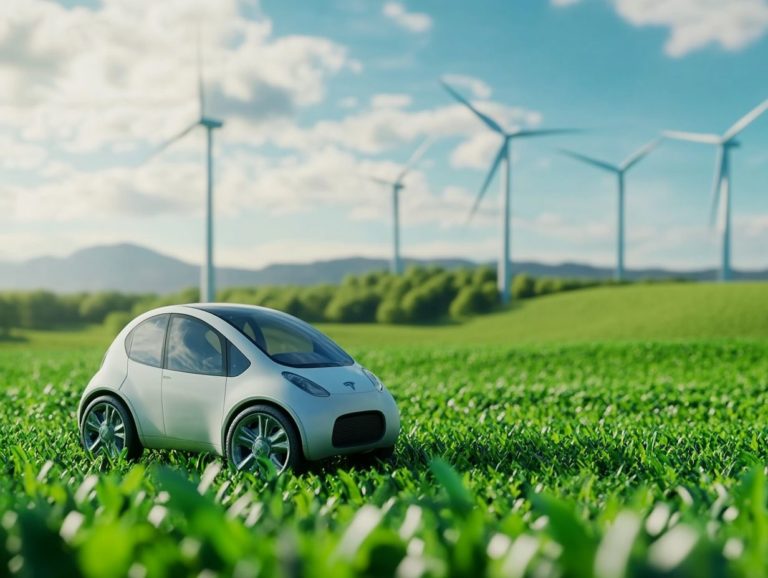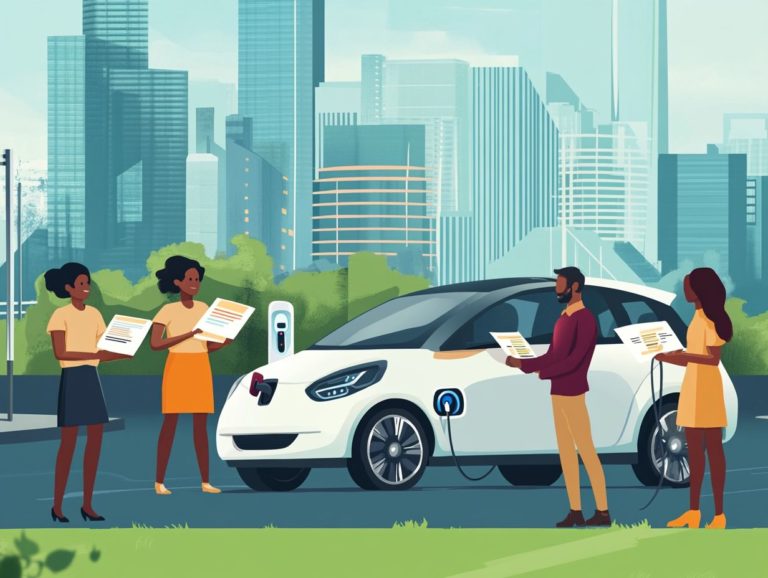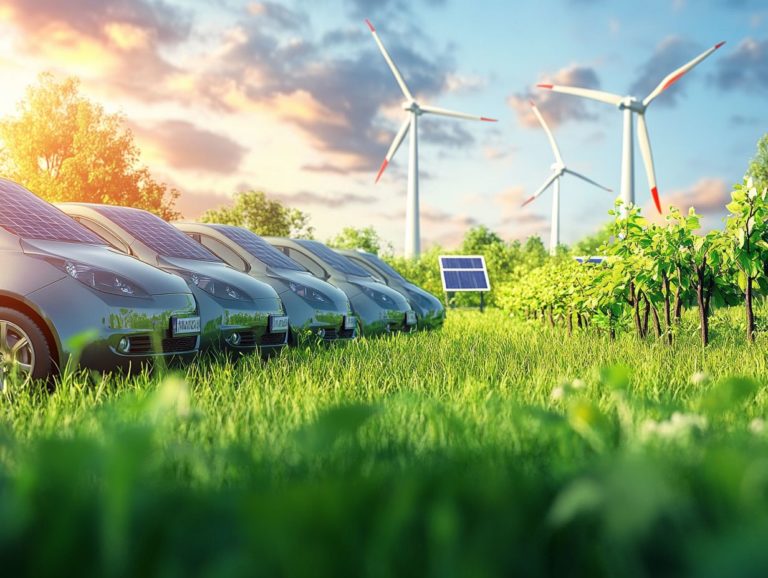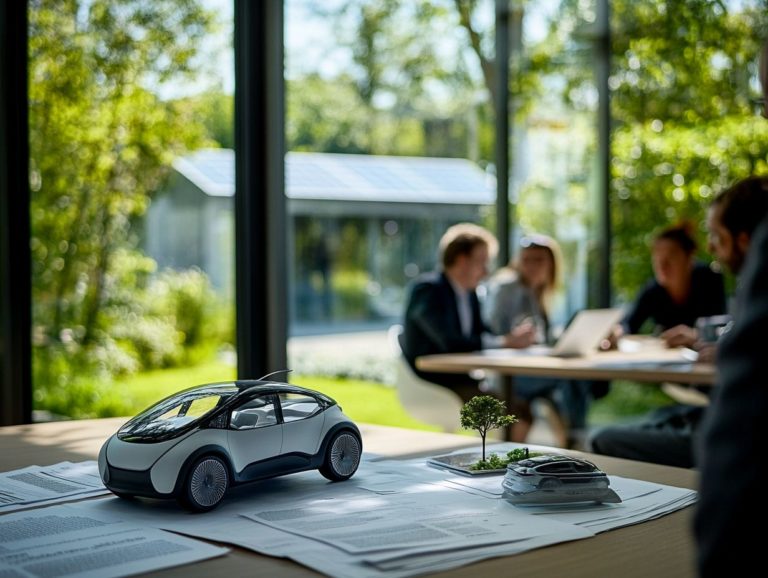Why EVs Are Crucial for a Sustainable Future
As you navigate the pressing challenges of climate change, the need for sustainable transportation has never been more critical. Traditional vehicles play a significant role in environmental degradation, but electric vehicles (EVs) present a promising alternative.
This exploration will guide you through the environmental impact of conventional cars and the mechanics of EVs. You ll discover their benefits, including reduced carbon emissions and improved air quality.
We’ll also discuss the barriers to widespread EV adoption and innovative solutions that promote a greener future. Understanding why EVs are essential for sustainability is key; let s delve into this vital topic together.
Contents
- Key Takeaways:
- The Importance of Sustainable Transportation
- Benefits of EVs for a Sustainable Future
- Barriers to Widespread Adoption of EVs
- Solutions to Promote EV Adoption
- Frequently Asked Questions
- Why are EVs crucial for a sustainable future?
- How do EVs contribute to a sustainable future?
- What makes EVs more environmentally friendly than traditional vehicles?
- Are there any financial benefits to switching to an EV?
- How do EVs compare to traditional vehicles in terms of performance?
- What Role Do EVs Play in Reducing Pollution?
Key Takeaways:
- EVs are crucial for a sustainable future as they reduce carbon emissions, improve air quality, and lessen dependence on fossil fuels.
- The cost and lack of infrastructure are major barriers to the widespread adoption of EVs.
- Incentives, government policies, and advancements in technology are key solutions to promote EV adoption and achieve a more sustainable transportation system.
The Importance of Sustainable Transportation
Sustainable transportation is vital in the fight against climate change. It helps lessen the environmental footprint of gas-powered vehicles.
The transportation sector is witnessing the rise of electric vehicles (EVs) as a solution for improving urban air quality. Embracing zero-emission vehicles allows you to reduce urban pollution and promote a cleaner environment for future generations.
This shift aligns with global sustainability objectives and highlights the need for robust public charging infrastructure to support this transition.
Environmental Impact of Traditional Vehicles
Gas-powered vehicles contribute to climate change and urban pollution through harmful emissions. These emissions release greenhouse gases like carbon dioxide and nitrogen oxides.
These gases not only contribute to global warming but also harm air quality. This leads to serious health concerns, such as respiratory illnesses, especially in urban populations.
We must address these urgent issues by exploring emissions reductions through innovative technologies and policy changes. Together, we can help pave the way for a sustainable future that mitigates climate change effects and fosters healthier communities.
What are EVs?
Electric vehicles (EVs) are zero-emission wonders that run primarily on electric energy. They use rechargeable batteries, which provide excellent performance and battery life, far surpassing traditional gas engines.
The automotive industry is shifting away from fossil fuels towards more sustainable alternatives. By using electricity, you actively contribute to reducing greenhouse gas emissions and enhancing air quality.
Rechargeable batteries store energy captured from renewable sources like solar and wind power. Transitioning to zero-emission options means enjoying lower operating costs and a cleaner environment.
Benefits of EVs for a Sustainable Future
Adopting electric vehicles (EVs) offers several benefits. They play a crucial role in reducing emissions, enhancing air quality, and decreasing reliance on fossil fuels.
These factors are essential for fostering a sustainable future and effectively combating climate change.
Reducing Carbon Emissions
Electric vehicles serve as a powerful ally in the quest to reduce carbon emissions. They play a crucial role in sustainable transportation and the global fight against climate change.
Research indicates that EVs can generate up to 60% lower lifetime greenhouse gas emissions compared to gasoline vehicles. This shows that embracing electric vehicles can greatly reduce the impacts of global warming. According to the International Council on Clean Transportation, a widespread transition to electric vehicles could help avert up to 1.5 gigatons of CO2 emissions by 2030. This statistic highlights the tangible benefits these vehicles can bring to enhancing air quality and shrinking the carbon footprint.
When paired with renewable energy sources like wind and solar, these sustainable transportation strategies significantly amplify their positive impact on the climate. They pave the way for cleaner, more eco-friendly choices for future generations.
Improving Air Quality
Transitioning to electric vehicles can enhance air quality, leading to cleaner air and a healthier environment elements vital for public health.
As more electric vehicles grace the streets, reliance on fossil fuels diminishes. This results in a notable decrease in harmful pollutants like nitrogen oxides and particulate matter. This transformation is particularly striking in cities like Los Angeles and Oslo, where the rise in EV usage correlates with clearer skies and a reduction in respiratory issues among residents.
In urban areas plagued by traffic congestion, the shift to electric mobility not only reduces air pollution but also encourages a more active lifestyle. Individuals are more inclined to walk or cycle in cleaner surroundings. This comprehensive positive impact underscores that embracing electric vehicles is essential for cultivating healthier communities.
Reducing Dependence on Fossil Fuels
Electric vehicles are key to using less fossil fuel. By harnessing renewable energy sources, they contribute to a sustainable future and lessen the environmental impact tied to traditional fuel consumption.
As you navigate a world increasingly affected by climate change and dwindling natural resources, switching to electric power becomes essential. EVs not only help reduce greenhouse gas emissions but also foster a growing demand for renewable energy. This energy is expected to make up nearly 70% of electricity generation by 2050, according to recent studies.
Thanks to advancements in battery technology, electric vehicles can effectively store energy generated from wind and solar. This establishes a cleaner energy cycle. With nearly 1.5 million electric vehicles on the road today, your choice to adopt them signifies a meaningful step toward a greener economy.
Experts predict that as infrastructure rapidly improves, this number could skyrocket to 13 million by 2030. This highlights the urgency of making this transition.
Barriers to Widespread Adoption of EVs
Despite the many advantages of electric vehicles, you might face a few challenges on your journey to widespread adoption. High costs and inadequate public charging infrastructure present significant hurdles for potential EV buyers.
Cost and Infrastructure Challenges
The financial burden of manufacturing and purchase costs for electric vehicles, combined with a lack of adequate public charging infrastructure, presents substantial hurdles.
These challenges might cause you to hesitate, leaving you concerned about the total cost of ownership and the convenience of charging options available in your area. For many, the excitement of electric vehicles is often overshadowed by anxiety about insufficient charging stations nearby. Tackling these issues could open the door to wider acceptance of EVs.
Government incentives, such as tax rebates and grants, along with innovative charging solutions like fast-charging stations and improved battery range, could encourage you to consider making the switch.
Join the movement towards a cleaner, greener future by choosing electric vehicles today!
Solutions to Promote EV Adoption
To encourage the widespread adoption of electric vehicles, you should consider various strategies. This involves implementing governmental incentives, fostering supportive policies, and driving advancements in technology that improve public charging infrastructure and lower costs.
By embracing these solutions, you play a crucial role in paving the way for a greener future.
Incentives and Government Policies
Government incentives and policies are crucial in encouraging the purchase and use of electric vehicles, driving emissions reductions, and fostering a sustainable transportation sector.
These initiatives often come in the form of tax credits, rebates, and grants tailored for both consumers and manufacturers, making electric vehicles more financially accessible. For example, California offers generous state rebates to support buyers, while federal tax credits enhance the appeal for electric vehicle enthusiasts.
Policies aimed at developing charging infrastructure ensure you have convenient access to charging stations when you need them. The impact of these initiatives is evident in countries like Norway, where a blend of tax exemptions and free access to public transport lanes has led to electric vehicles making up a significant portion of new car sales.
This demonstrates a strong commitment to reducing greenhouse gas emissions and sets a powerful example for others to follow.
Advancements in Technology
Advancements in technology, especially regarding battery life and public charging infrastructure, are crucial for enhancing the performance and accessibility of electric vehicles, ultimately driving their adoption.
These innovations are reshaping the realm of sustainable transportation, making it increasingly viable for you as a consumer. Improved battery capacities now allow for longer ranges, effectively easing the range anxiety that has historically held potential buyers back. Rapid charging technologies are progressing, enabling recharge times that can compete with traditional fuel stops.
The integration of renewable energy sources, such as solar and wind, into charging networks not only reduces the carbon footprint linked to EV usage but also stabilizes costs. Together, these advancements tackle key challenges and pave the way for a future where electric vehicles emerge as the go-to choice for eco-conscious drivers like you.
Frequently Asked Questions
Why are EVs crucial for a sustainable future?
EVs, or electric vehicles, are crucial for a sustainable future because they do not emit harmful pollutants like traditional gasoline or diesel vehicles. This helps reduce air pollution and improve overall air quality, which is essential for sustainability.
How do EVs contribute to a sustainable future?
EVs contribute to a sustainable future in various ways:
- Reduce dependence on fossil fuels, combating climate change.
- Utilize renewable energy sources like solar and wind power, further reducing carbon emissions.
- Have lower maintenance costs.
- Help reduce noise pollution in cities.
What makes EVs more environmentally friendly than traditional vehicles?
EVs have zero tailpipe emissions, meaning they do not release pollutants into the air. They run on electricity instead of gasoline or diesel. By using renewable energy sources to power EVs, they can significantly reduce the carbon footprint of transportation.
Are there any financial benefits to switching to an EV?
Yes, there are financial benefits to switching to an EV:
- Lower fuel costs, as electricity is typically cheaper than gasoline or diesel.
- Fewer moving parts, leading to lower maintenance costs.
- Some countries offer incentives like tax credits for purchasing an EV.
How do EVs compare to traditional vehicles in terms of performance?
EVs are comparable, if not superior, to traditional vehicles in performance. They provide instant torque for quick and smooth acceleration. Additionally, their lower center of gravity improves handling. With advancements in technology, EVs are becoming even more powerful and efficient.
Now is the time to consider EVs for a sustainable future! Explore the options and incentives available in your area.
What Role Do EVs Play in Reducing Pollution?
Transportation contributes a lot to pollution, but switching to electric vehicles (EVs) can make a big difference. With renewable energy powering EVs, we can nearly eliminate harmful emissions.
As more people choose EVs, we can significantly lower the transportation sector’s impact on climate change. Join the movement for a cleaner future!

